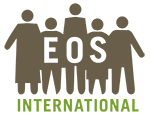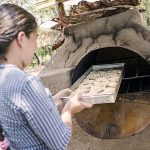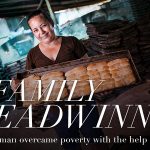One Woman’s Mission to Provide Clean Water
Throughout my life, a couple of formative experiences engrained my commitment to sustainability and clean water access, and eventually led me to a six-month volunteer fellowship with EOS International:
- I spent a year living in the Atacama Desert in Chuquicamata, Chile, where groundwater was so polluted from an open-pit copper mine that the entire city of was condemned.
- For three summers, I was a backcountry guide in the Boundary Waters Canoe Area Wilderness of Northern Minnesota, where the water is free, pure, and plentiful.
- As part of a volunteer project, I worked with a municipal water utility to improve water access for low-income customers.
After graduating from Bradley University with degrees in Economics and Spanish, I began working for West Monroe Partners, a management and technology consulting firm in Chicago. In my time at West Monroe I worked with municipal water utilities – further growing my passion for clean water resources. Earlier this year, I was awarded a six month fellowship by West Monroe to assist EOS International in growing their clean water program.
Water is a critical resource that we often take for granted. In Nicaragua there are thousands of rural surface-water systems that lack filtration or chlorination capabilities, leaving community water supplies vulnerable to contamination. I am excited to be working with EOS’ clean water program to make water a safe, accessible, and publicly-available resource in Nicaraguan communities.
I arrived in Nicaragua about a month ago – It is difficult to know how to begin in describing my experience so far– it is a whole different world here. The family I am living with and the team of Nicaraguan staff are wonderful. This fellowship has me humbled, stretched, and inspired.
Since arriving I have visited a variety of rural water chlorination sites and met with community leaders in these areas. The more I learn, the more overwhelmed I am by the challenge of delivering clean water. The government says it is unable to deliver potable water to all cities, let alone the rural villages in which I am working. It is so difficult to address some of the challenges this brings – there is limited water quality testing, so community leaders are unaware, and often times resistant to the idea, that pathogens and bacteria are present in their water supply. Sometimes there are community members who are against chlorine treatment of the water supply, which can prevent an entire community from receiving treated water.
Communities that want to install water treatment systems must self-organize a local water committee. EOS helps the community gain consensus that a chlorination system is needed, then helps install, train, and maintain chlorinators.
In the coming months I will be working with the EOS Nicaragua team to partner with local water committee, install and repair water chlorination systems, and make operational improvements within the clean water program. I love witnessing first-hand the impact water chlorination systems have in communities. The impact of clean water is truly life-changing, and I am excited to be a part of this critical program in Nicaragua.
Photo: Last week, we visited a water chlorinator in Condega and re-trained community members in maintaining consistent chlorine levels. As you can see, it was getting dark – our return (on foot) over a rickety suspension bridge was likely one of the more-dangerous things I have done!




